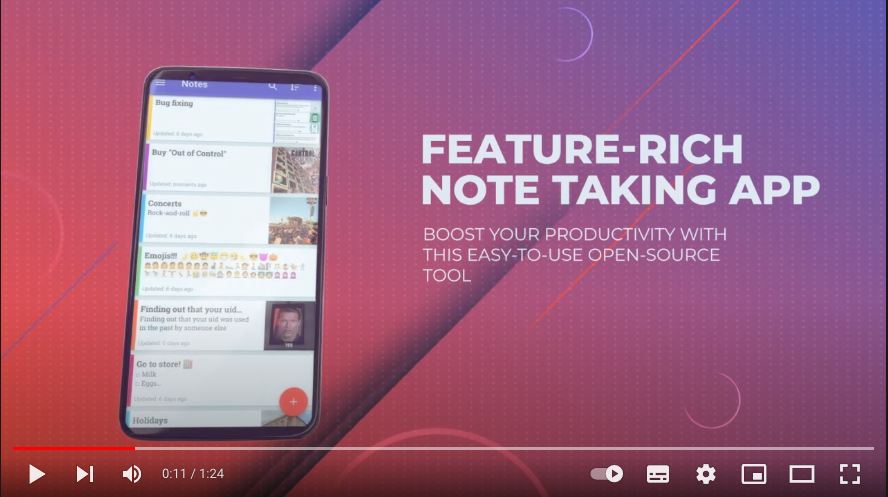
Omni-Notes
Omni-Notes is a note taking open-source application aimed to have both a simple interface while keeping smart behavior. This application expands on the generic note taking features of other basic applications and allows for users to attach image and video files, use a variety of widgets, tag and organize notes, search through notes, and customize the applications UI.
The project was inspired by the absence of such applications compatible with old phones and old versions of Android. It aims to provide an attractive look and follow the most recent design guidelines of the Google operating system that is not currently avaialbe for older devices.
Follow the developments and post your comments and advice on Telegram Community at https://t.me/omninotes
Help to keep translations updated is always welcome, if you want give a hand checkout the translation project on https://translate.omninotes.app.
If you're willing to help speeding up developments please also opt-in for the Alpha version of the app following continuous delivery principles:
Features
Currently the following functions are implemented:
- Material Design interface: Basic add, modify, archive, trash and delete notes actions
- Advanced Navigation and Sharing: Share, merge and search notes, Export/import notes to backup
- Media Attachments: Image, audio and generic file attachments
- Organization: Manage your notes using tags and categories
- Specialty Features:To-do list, Sketch-note mode, Google Now integration: just tell "write a note" followed by the content
- Widget Capabilities: Multiple widgets, DashClock extension, Android 4.2 lockscreen compatibility, Notes shortcut on home screen
- Internationalization: Multilanguage: 30+ languages supported: https://crowdin.com/project/omni-notes
Future Developments:
- Notes sychronization
- Web interface to manage notes (stub project)
You can find a complete changelog inside the application settings menu!
If you need some help on how to use the application you'll find everything you need in the Help Online section.
User guide
Look into the wiki for GIFs-based tutorials: LINK
Build
Watch the following terminal session recording on how to compile distributable files or follow the instructions below

Build instructions:
- Enter your computer's terminal
- Clone the application by using the link to the repository (https://github.com/federicoiosue/Omni-Notes), this will take a couple minutes
- Enter the Omni-Notes folder using the command $cd Omni-Notes
- Check that the branch is up to date by using the command $git status
- Enter the command $export ANDROID_HOME=/home/fede/Android/Sdk (for Windows $set ANDROID_HOME=/home/fede/Android/Sdk)
- Enter the command $./gradlew assemble
- Allow a couple minutes for the application to build.
- View the outputs of the build using the command $ls -l omniNotes/build/outputs/apk
To be sure that build environment is fully compliant with the project the following command creates a container with all the needed tools to compile the code:
cd {project-folder}; rm local.properties; docker rm android-omninotes; docker run -v $PWD:/workspace --name android-omninotes tabrindle/min-alpine-android-sdk:latest bash -c "mkdir -p ~/.android && touch ~/.android/repositories.cfg && yes | sdkmanager --update &>/dev/null && cd /workspace && ./gradlew clean build --stacktrace -Dorg.gradle.daemon=true -Pandroid.useDeprecatedNdk=true"
Test
To execute all tests included into the project connect a device or emulator, then run the following command:
./gradlew testAllTesting Pyramid
To speedup the development more levels of testing are available following the testing pyramid approach, each type test requires more time than the previous one.
Unit Tests
./gradlew --stacktrace testIntegration Tests
./gradlew --stacktrace -Pandroid.testInstrumentationRunnerArguments.notAnnotation=androidx.test.filters.LargeTest connectedAndroidTestUI Tests
./gradlew --stacktrace -Pandroid.testInstrumentationRunnerArguments.annotation=androidx.test.filters.LargeTest connectedPlayDebugAndroidTestNotice that in this case I specified a single flavor to run tests on. This could be a useful and faster approach when you're testing specific flavor features.
Mentioned on
XDA Android Authority Addictive Tips Techalook DZone Slash Gear quaap.com Freeappsforme.com
Developed with love and passion by
- Federico Iosue - Website
- Other contributors
License
Copyright 2013-2024 Federico Iosue
This program is free software: you can redistribute it and/or modify
it under the terms of the GNU General Public License as published by
the Free Software Foundation, either version 3 of the License, or
(at your option) any later version.
This program is distributed in the hope that it will be useful,
but WITHOUT ANY WARRANTY; without even the implied warranty of
MERCHANTABILITY or FITNESS FOR A PARTICULAR PURPOSE. See the
GNU General Public License for more details.
You should have received a copy of the GNU General Public License
along with this program. If not, see <http://www.gnu.org/licenses/>.















